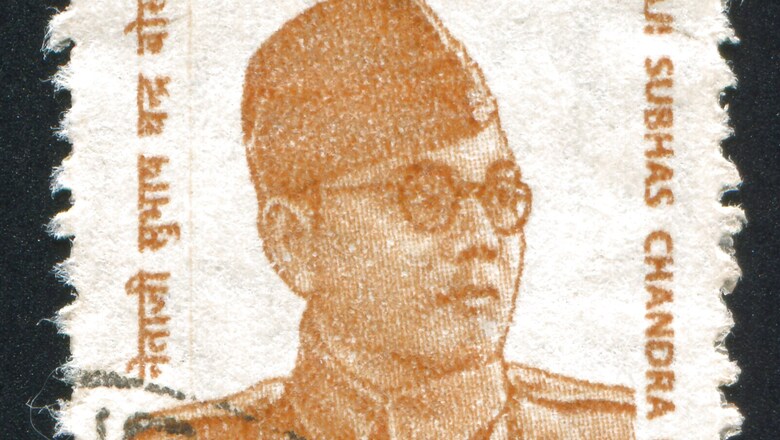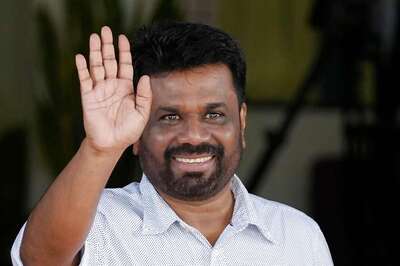
views
One of the less discussed aspects about Subhas Chandra Bose has been his penchant for covert operations. On this point too, among many others, his political views and activities clashed with those of Mahatma Gandhi.
The close association that Bose had with the revolutionary groups during his student days introduced him to the techniques of covert operations that was at the core of these groups. It soon became a recurring theme, one of the characteristic strands of his entire political career. The officers of the British and Indian intelligence services were probably the only ones who could be said to have adequately grasped this less-discussed side of Subhas Bose.
He was constantly followed, informers often remained close to him and more often than not, Bose was aware of it. In this game of cat and mouse, Bose succeeded phenomenally in hoodwinking them time and again even with fewer resources at his disposal.
The first occasion when Bose faced the consequences of being tailed by a network of informers was in 1924. Still a greenhorn in politics, he had been appointed the Chief Executive Officer of the Calcutta Corporation, but was thrown into prison based on reports of secret agents.
The surveillance not only continued but was most likely strengthened when Bose became the Congress president. It has been suggested that at the heart of his conflict with Gandhi and the Congress high command was certain findings about his activities by the intelligence agencies. It was, however, not only the British who were involved in the surveillance and its consequences, but the Congress home minister of Bombay, K.M. Munshi, a staunch follower of Gandhi’s non-violence creed, was also embroiled in the controversy. (Reference: Sugata Bose, His Majesty’s Opponent)
A flutter was created in the official circles by two articles published in the Bombay Sentinel in July 1938, titled ‘Clear Up Nazi Cob-Web In India’ and ‘Challenge To Come Out In The Open’, accusing Dr Oswald Urchs, a member of the National Socialist Party, of spying and propaganda activities in India under the pretext of commercial activities. Questions were raised in the Legislative Assembly, on the basis of these articles, by Congress members Mohan Lal Saxena and S. Satyamurti in August and September 1938. The intelligence agencies were monitoring the activities of Urchs and his organisation, but the Government wanted to give an impression that it was not too interested in the matter, lest the Nazi agents in India were alerted.
When Bose met Urchs on December 22, 1938, it would have been noted by the intelligence agencies. Pratul Chandra Ganguli, a revolutionary associate of Bose in Calcutta and a member of the Bengal Legislative Assembly, recounted how Bose used to clandestinely meet the German officials in Bombay:
… during 1938, Netaji, who was then President of the Congress, spent some time in Bombay where he was in active contact with the German Consul. Netaji took great precaution while meeting the Consul; for example, he would go to a friend’s house for lunch, after which he would retire for rest, and all the guests would naturally depart. He would then change his dress, and put on sufficient disguise to hide his identity and go out to meet the Consul in the house of another friend, changing his taxi on his way.
Although there might be some element of truth in such stories, and it certainly has good ingredients for a spy thriller, there is clearly much embellishment in these accounts, which came to create an enigmatic aura around Bose.
However, it was not all just imagination. K.M. Munshi, then home minister of Bombay, later wrote that when Bose was in Bombay:
… there were stories current that he met people and even went out to see people in disguise. The Government of India knew my relations with Gandhiji and Sardar [Patel], and often saw to it that confidential information reached Gandhiji through me. On one such occasion, I was shown certain secret service reports that Netaji had contacted the German Consul in Calcutta and had come to some arrangement with him, which would enable Germany to rely upon him in case there was a war. I conveyed the information to Gandhiji, who naturally felt surprised.
It is more than likely that such clandestine affairs and linkages with German officials would have played a role in turning Gandhi away from the possibility of re-electing Bose as the Congress president. Never an admirer of the clandestine methods of the revolutionary societies, Gandhi articulated his position in 1933. Regarding secret operations, he said:
There is nothing inherently wrong in them. I fully admit the purity of purpose and the great cleverness of the workers in conducting the campaign by secret methods, devised to meet the situation created by repressive measures of the Government. But secrecy is repugnant to satyagraha and hampers its progress. It has undoubtedly contributed in a great measure to the present demoralization of the people. I know that a ban on secrecy will stop some of the activities which appeared to keep the Congress before the public eye. But this doubtful benefit will be outweighed by the certain elimination of a method which is foreign to the spirit of satyagraha and which interferes with its efficacy.
The contrary point of view was articulated by a revolutionary of yester years, Rash Behari Bose. In a January 1938 letter to Bose, he wrote:
In a subject country no constitutional and legal organisation can ever secure freedom … Only unconstitutional or illegal organisations from the British point of view can lead the country to independence. The Congress became an unconstitutional body at the time of the civil disobedience movement and hence it could do immense work.
This was thus the fundamental difference between Gandhi and Bose and those who had been associated with revolutionary societies. Whether making use of intelligence supplied secretly by the Government to Gandhi violated his principle is a moot point, but it is difficult to ignore the fact that whatever impact the next big mass movement—the Quit India movement—had, was because it operated with some success by going underground. Gandhi, of course, went on to disown the movement, but it didn’t prevent the party he led from taking credit for it.
Chandrachur Ghose, author of the upcoming biography Bose: The Untold Story of an Inconvenient Nationalist, published by Penguin, which is available for pre-order. He is co-founder of Mission Netaji, the pressure group that has successfully campaigned from 2006 resulting in the declassification of hundreds of secret files on Netaji. The views expressed in this article are those of the author and do not represent the stand of this publication.
Read all the Latest Opinions here




















Comments
0 comment